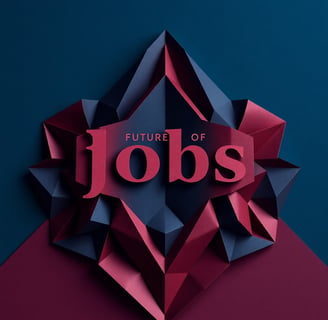Future of Jobs Report 2025: AI's Impact on Employment
The Future of Jobs Report 2025 reveals how AI is reshaping industries, predicting the creation of 78 million new jobs by 2030 and the displacement of 9 million roles. Leaders must adapt to these ch...
Andrew Cooke
1/14/20256 min read


Introduction
The future of work is evolving faster than ever, and at the centre of this transformation is artificial intelligence (AI). The Future of Jobs Report 2025 by the World Economic Forum sheds light on how AI and other major trends are reshaping industries, redefining jobs, and creating opportunities—alongside challenges.
By 2030, the global workforce is projected to grow by 7%, with 78 million new jobs emerging. But it’s not all good news: AI and automation will also displace millions of roles, leaving business leaders with tough decisions about how to adapt, innovate, and thrive. AI and automation are forecasted to create 11 million new jobs while displacing 9 million others. Roles such as AI Specialists and Renewable Energy Engineers are projected to grow, whereas clerical and repetitive jobs face significant declines.
This isn’t just a glimpse of what’s coming; it’s a call to action for leaders. Here’s a deeper dive into the report’s findings and how you can position your business to succeed in this rapidly changing landscape.
AI: The Biggest Game-Changer in the Labour Market
AI is no longer a futuristic concept—it’s a reality transforming how businesses operate. Since generative AI (GenAI) entered the mainstream in 2022, its adoption has skyrocketed. From automating routine tasks to generating creative content and insights, GenAI is driving productivity gains across industries. AI and Generative AI (GenAI) are leading the technological transformation, with 86% of surveyed employers anticipating significant business impacts by 2030.
The Rise of AI Across Sectors:
Industries like healthcare, finance, IT, and manufacturing are seeing dramatic shifts.Healthcare: AI tools now assist doctors in diagnosing diseases with higher accuracy, while wearable tech monitors patient health in real time.
Finance: AI-driven algorithms enable real-time fraud detection and investment analysis.
Manufacturing: Smart factories powered by AI and robotics are streamlining production processes, cutting costs, and increasing output.
The Adoption Gap:
Advanced economies are leading the charge, with high levels of investment in AI tools and infrastructure. In contrast, developing regions face significant barriers, such as limited digital access and insufficient funding for AI adoption. This creates a risk of deepening global inequality unless more equitable solutions—like cross-border partnerships and investments—are prioritised.Automation vs. Augmentation:
The debate over AI replacing versus complementing jobs continues. The report predicts that while automation will handle repetitive, data-heavy tasks, augmentation will enhance human productivity. Leaders must focus on designing systems that empower their workforce rather than marginalising it.
Reskilling for the Future: What Workers (and Leaders) Need
By 2030, nearly 40% of the skills workers rely on today will change. That means businesses can’t rely on the status quo; they’ll need to invest heavily in reskilling and upskilling to keep their teams competitive.
Top Skills in Demand:
The report highlights three categories of critical skills:Technical Skills: AI literacy, data analytics, cybersecurity, and technological adaptability.
Human-Centric Skills: Creativity, resilience, critical thinking, and leadership.
Sustainability Expertise: Skills tied to the green transition, such as environmental science and renewable energy.
The Skills Gap is Real:
63% of employers identify skill gaps as their biggest challenge to transformation. Reskilling is essential, with 59% of workers are expected to need to go under some form of training by 2030 to stay employable, but the pace of reskilling needs to accelerate.What Businesses Can Do:
Create in-house training programs tailored to emerging roles.
Partner with universities and online platforms to offer flexible learning options.
Foster a culture of lifelong learning, encouraging employees to explore new skills proactively.
Five Macrotrends Shaping the Workforce
AI isn’t the only force at play. The report identifies five key trends that are reshaping jobs globally:
Technological Innovation:
Robotics, automation, and AI are creating high-tech roles but displacing repetitive, clerical tasks.
Stat: By 2030, AI is expected to boost global GDP by 14%, or $15.7 trillion, according to PwC.
Economic Uncertainty:
High inflation and slower growth are forcing businesses to innovate under pressure.
Stat: The IMF predicts global growth will stabilise at 3% annually over the next five years, below pre-pandemic levels.
The Green Transition:
Climate change is driving demand for sustainability-focused jobs, such as renewable energy engineers and ESG specialists.
Stat: The International Renewable Energy Agency (IRENA) estimates that by 2030, the renewable energy sector alone could support 38 million jobs globally.
Demographic Changes:
Aging populations in high-income countries are increasing reliance on automation, while younger, expanding workforces in developing nations offer a fresh talent pool.
Geopolitical Tensions:
Trade restrictions and supply chain disruptions are reshaping markets, with companies investing in cybersecurity and localisation to mitigate risks.
Humans and Machines: A Collaborative Future
By 2030, humans will perform only 33% of work tasks (down from 47% today), with machines and human-machine collaboration taking the rest. This shift requires a rethinking of how technology integrates with people.
Automation and augmentation will reshape workflows, demanding strategic alignment between technological integration and workforce planning.
Augmentation in Action:
In healthcare, AI augments doctors, improving diagnosis and treatment while maintaining human empathy. Similarly, in customer service, chatbots handle routine queries, leaving humans to solve more complex problems.Scaling Across Industries:
To replicate this balance, businesses must invest in augmentative technologies that elevate human potential, rather than replacing it outright.
Implications for Business Executives and Leaders
AI Integration and Workforce Resilience:
Leaders must invest in AI training programs and reskilling initiatives to empower their workforce to adapt and thrive alongside AI systems.
Clear ethical and operational frameworks for AI deployment are essential to ensure fairness, inclusivity, and long-term success.
Strategic Workforce Planning:
Adopt dynamic workforce strategies focusing on reskilling and redeployment to address skill gaps and job displacement risks.
Prioritise employee well-being, fostering adaptability and creativity to counter automation's disruptive impacts.
Technology and Talent Acquisition:
Shift hiring practices to prioritise AI competencies, sustainability expertise, and leadership capabilities in dynamic environments.
Collaborate with educational institutions to align curriculum with evolving industry needs.
Mitigating Geoeconomic Risks:
Build resilient supply chains and diversify operations to reduce dependency on geopolitically sensitive regions.
Invest in automation and technology to counter workforce challenges in ageing economies.
Leveraging the Green Transition:
Capitalise on emerging opportunities in renewable energy and sustainability by integrating green skills into organisational priorities.
Align business operations with environmental, social, and governance (ESG) frameworks to attract investors and talent.
Recommended Strategies
Develop AI Governance:
Establish robust AI policies, addressing ethical considerations, data security, and compliance.
Invest in Human-Centric AI:
Promote AI tools that enhance human productivity rather than solely replacing roles.
Foster Collaboration:
Partner with industry bodies, governments, and academia to address systemic challenges like skill mismatches and job displacement.
Enhance Leadership Agility:
Build leadership capabilities to navigate uncertainties, leveraging foresight tools and scenario planning.
Drive Inclusivity and Sustainability:
Expand DEI initiatives to tap into underutilised talent pools.
Commit to sustainability goals, ensuring your organisation is positioned for the green economy.
Final Thoughts: Are You Ready to Lead?
The Future of Jobs Report 2025 shows us what’s at stake: AI is both a challenge and an opportunity. The choices you make now will determine whether your organisation thrives or merely survives in the years ahead.
Ask yourself:
How can AI make your business more innovative and inclusive?
Are you equipping your workforce with the skills they’ll need to succeed?
How can your organisation leverage AI to enhance productivity without marginalising employees?
What strategies are in place to reskill your workforce for emerging roles?
What measures can you take to foster a culture of continuous learning and adaptability?
Is your organisation ready for the challenges of climate change and geopolitical uncertainty?
Are your business operations aligned with sustainability goals and ESG principles?
How resilient is your organisation’s supply chain against geopolitical and economic disruptions?
The time to act is now. Build a future-ready business by investing in people, embracing innovation, and leading with agility. Don’t wait for the change to come—shape it yourself.
Next Steps
The time to act is now. As the workforce undergoes unprecedented change, proactive leadership will be the difference between thriving and merely surviving. Invest in your people, embrace innovation, and build a future-ready organisation that capitalises on the opportunities of tomorrow. Connect with experts, explore partnerships, and chart your path to sustainable success today.
GPS Artificial Intelligence
At Growth & Profit Solutions AI, we specialize in helping businesses navigate the complexities of scaling AI, ensuring ethical use, and driving measurable outcomes. We’re here to help you make the leap. We bring deep expertise in scaling AI, building robust governance frameworks, and ensuring measurable outcomes. Whether you’re looking to scale up existing initiatives or explore the potential of agentic AI, we provide tailored guidance to help you achieve real results.
Explore our tools to get started:
Access your free resources today and begin your AI journey with confidence:
Download Our 2025 AI & Business Roadmap: A step-by-step guide to assess your readiness.
Access Our AI & Business Implementation Diagnostic: Complete this survey and get your custom report and identify your 3 strongest areas and the 3 areas for improvement.
Schedule a Consultation with Andrew Cooke: Discover how we can design and deploy AIMS tailored to your business needs.
Email: andrew.cooke@business-gps.com.au
Website: https://www.gps-ai.com.au
GROWTH & PROFIT SOLUTIONS - AI
Empowering businesses with tailored AI & business consulting services.
ANDREW COOKE - CONTACT DETAILS
CONTACT US
andrew.cooke@business-gps.com.au
+61 (0)401 842 673
© 2025. All rights reserved.
